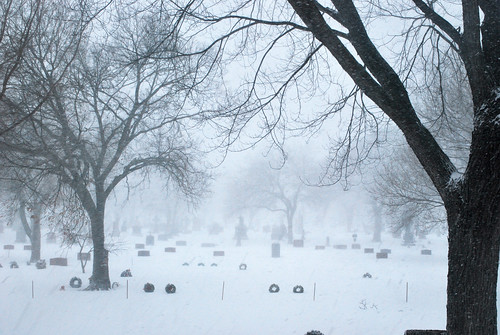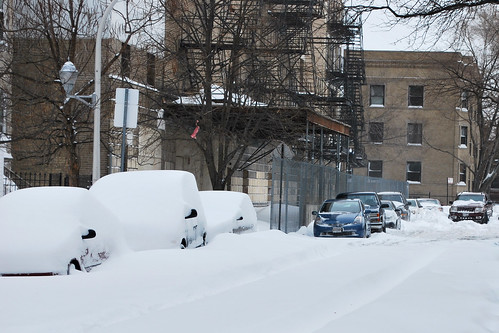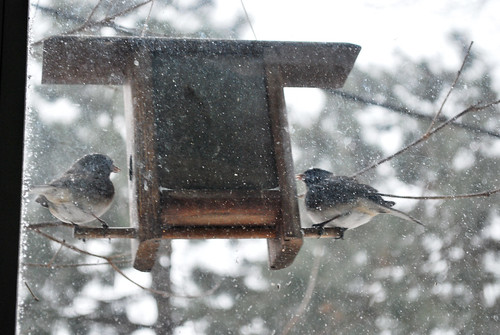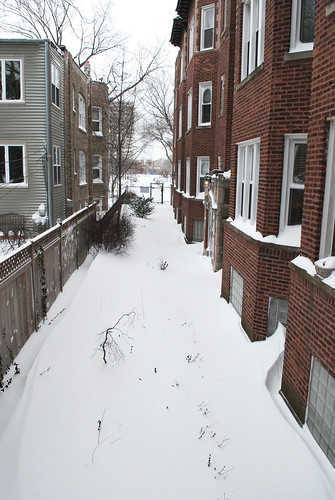
{Photos by rocketlass.}
Pleasantly housebound by the third-largest snowfall in Chicago history, I turn for today's post to some old favorites, all reliably sound on the subject of snow.
First, there's E. B. White, whose thoughts on snow have already graced my Tumblr and Twitter feeds today. A pleasantly rambling New Yorker essay from 1971, "The Winter of the Great Snows," offers plenty of thoughts on the stuff, so much a part of White's Maine winters. "When snow accumulates," writes White,
week after week, month after month, it works curious miracles. Familiar objects simply disappear, like my pig house and the welltop near the barn door, and one tends to forget that they are there. Our cedar hedge (about five feet high) disappeared months ago, along with the pink snow fences that are set to hold the drifts. My two small guard dogs, Jones and Susy, enjoy the change in elevation and the excitement of patrol duty along the crusted top of the hedge, where they had never been before. They have lookout posts made of snow that the plow has thrown high in the air, giving them a chance to take the long view of things.A chance, at least when considered metaphorically, that I doubt they took--unless perhaps the secret of dogs' good natured satisfaction is a quiet far-sightedness? No, scratch that thought: the dog I saw romping in front of our building moments ago was unquestionably living only in, for, and of the present moment.

White comments on a phenomenon that rocketlass and I got to see firsthand this afternoon when we finally ventured out: the plight of those in the path of the plow. Writes White:
Every new swipe of the plow hurls a gift of snow into the mouth of a driveway, so that, in effect, the plowmen, often working while we sleep snug in our beds, create a magnificent, smooth, broad highway to which no one can gain access with his automobile until he has passed a private miracle of snow removal. It is tantalizing to see a fine stretch of well-plowed public road just the other side of a six-foot barricade of private snow. My scheme for town plowing would be to have each big plow attended by a small plow, as a big fish is sometimes attended by a small fish. There would be a pause at each driveway while the little plow removes the snow that the big plow has deposited. But I am just a dreamer.The grade-school philosopher in me sees a risk of infinite regression, of ever-smaller plows followed by ever-smaller plows ad infinitum, but I suppose that, come February, a driveway owner in rural Maine would likely be willing to take that chance.
White's essay reminds me of a some moments from Nicholson Baker's wonderfully contemplative little book A Box of Matches (2003), such as this passage, in which his similarities to White are fully on display:
[L]ast month we had that very unusual snowfall that ticked against the window all night. It was an unusual snow, almost like Styrofoam in its consistency in some of the deep places, and when you dug in it, the light that it let through was an interesting sapphire blue--perhaps different prevailing temperatures during snowflake-growth result in a different shape of crystal, which absorbs and allows passage to different wavelengths of light. That Saturday Henry and I dug a tunnel through the snowplow pile. The duck became interested in our project--companionably she climbed to the top, beaking around in it for bits of frozen mud. When both of her feet got cold at the same time she sat down in the snow for a while to warm them. Once or twice she levitated, flapping hard. She didn't much want to walk through the tunnel, and we didn't make her.Baker also reminds me of Thoreau in that passage, his ever-attentive eye trained on minute details of the snow, as his mind ticks away in the background trying to understand their whys and wherefores.

Thoreau himself, not unexpectedly, is good on snow: his Journals offer entry after wintry entry filled with descriptions of and inquiries about snowfall. In honor of today's Chicago, where last night's thundersnow has drifted in places higher than a man's head, I'll choose the entry of January 13, 1852:
Would not snow-drifts be a good study,--their philosophy and poetry? Are they not worthy of a chapter? Are they always built up, or not rather carved out of the heaps of snow by the wind passing through the chinks in the walls? I do not see yet but that they are builded. They are a sort of ripple-marks which the atmospheric sea makes on the snow-covered bottom.Snow has fallen, snow on snow, snow on snow, but from our cozy home here beneath the atmospheric sea the midwinter is far from bleak. Books and cats and tea, and snow as far as the eye can see--how can we complain?

Hey Levi,
ReplyDeleteNice post; the essay that you quote sounds wonderful. I hope you do manage to get your car off your driveway eventually, or are able to dig yourselves out by other means! We had a crzy amount of snow here in the UK before Xmas, but all gone now, thankfully.
I've actually just done a quick re-jig of my blog and Ivebeenreadinglately is sat proudly on the blogroll; is there any chance, if you like my blog of course, you could add me to yours? Don't worry if not.
Thanks,
Lyndsay Wheble
Belden and Clark? Very familiar looking, that's for sure. Kevin
ReplyDeleteNot terribly far off: that's a show down Magnolia, toward Lawrence. They finally plowed Magnolia early this afternoon, which, though I'm sure drivers were grateful, kind of made me sad. The drifts across the center of its intersections with smaller streets were amazing and lovely, as were, in their own way, the narrow paths people had cut through them with foot and shovel.
ReplyDelete